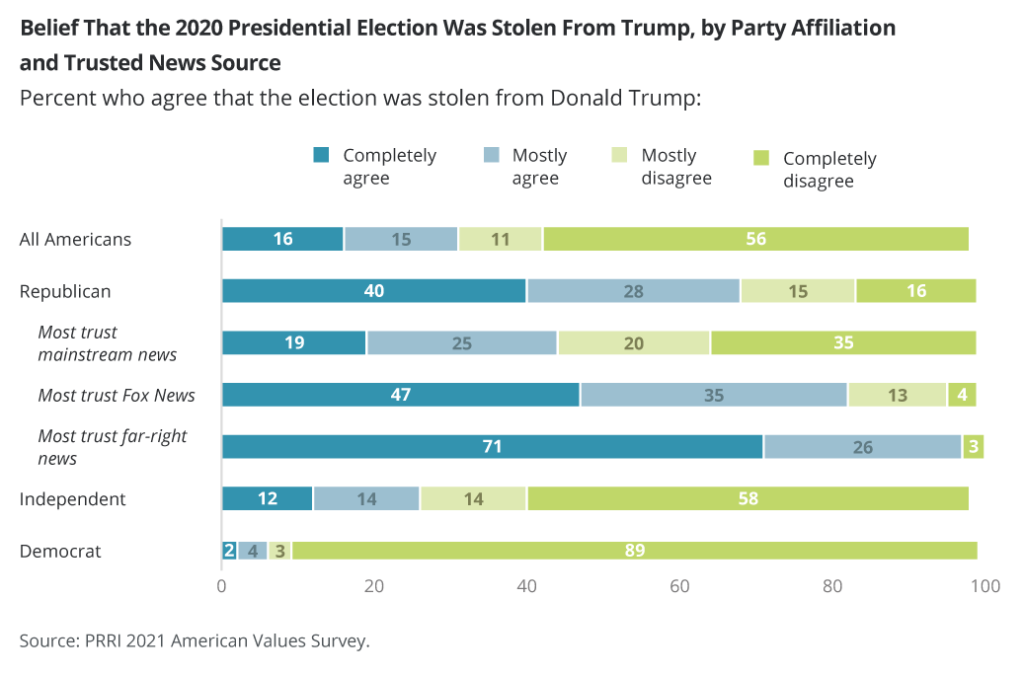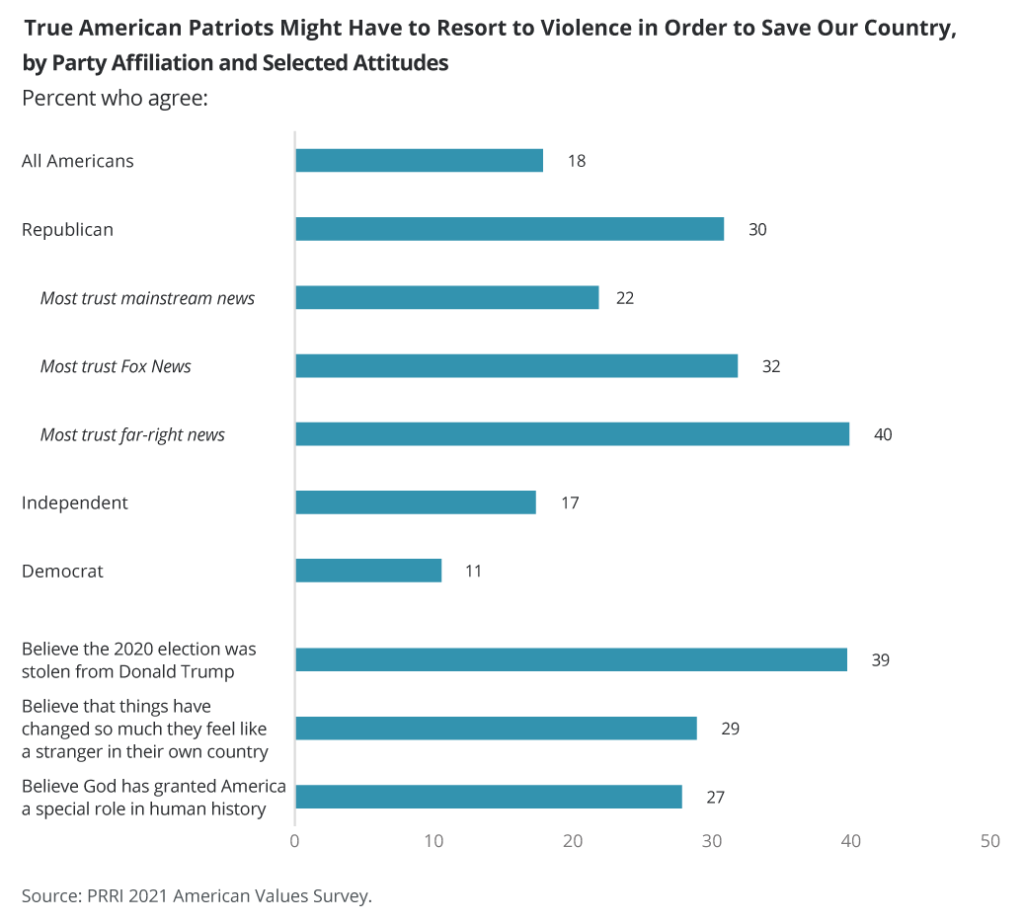As the nation prepares to observe the first anniversary of the January 6 insurrection at the U.S. Capitol, PRRI’s 2021 American Values Survey, fielded in October 2021, illuminates the sharp partisanship following the first time that a peaceful transfer of power failed to take place in America’s 245-year history. Some of the most troubling and challenging divides among the American people can be found in how we view the outcome of 2020’s free and fair national election, our entanglement in dangerous conspiracy theories, and how both of these issues are fueling voices in support of or desirous for political violence in the United States.
The Big Lie Maintains Its Hold on Republicans
As of October 2021, around three in ten Americans (31%) say that the 2020 presidential election was stolen from Donald Trump. This share has remained steady throughout 2021, in August (29%), June (30%), and March (29%).
More than two-thirds of Republicans (68%), compared to 26% of independents and 6% of Democrats, believe that the election was stolen from Trump. These shares are even greater among Republicans who most trust Fox News (82%) and essentially universal among those who most trust far-right news (97%). Less than half of Republicans who most trust mainstream news agree (44%).
A majority of white evangelical Protestants (60%) and around four in ten white Catholics (40%) and white mainline (non-evangelical) Protestants (37%) believe that the election was stolen from Trump. Smaller shares of other Christians (29%), Hispanic Catholics (19%), Black Protestants (18%), and religiously unaffiliated Americans (17%) agree.
White Americans (36%) are most likely to believe the 2020 election was stolen from Trump, while Hispanic Americans (22%) are slightly more likely than Americans of other races (18%) and Black Americans (16%) to agree.
Americans with high school degrees or less (38%) or some college experience but no four-year degree (32%) are somewhat more likely than those with four-year degrees (24%) or postgraduate degrees (14%) to say that the election was stolen from Trump.
QAnon Beliefs Hold Steady
Around one in five Americans agree with these three core tenets of the QAnon movement:
- “There is a storm coming soon that will sweep away the elites in power and restore the rightful leaders” (21%).
- “The government, media, and financial worlds in the U.S. are controlled by a group of Satan-worshipping pedophiles who run a global child sex-trafficking operation” (18%).
- “Because things have gotten so far off track, true American patriots may have to resort to violence in order to save our country” (18%).
Responses to these questions were combined into an additive QAnon belief scale, which was then recoded into three groups: (1) QAnon believers, or respondents who completely or mostly agreed with these statements (17%); (2) QAnon doubters, or respondents who mostly disagreed with these statements (49%); and (3) QAnon rejecters, or respondents who completely disagreed with all three statements (34%).
These shares are relatively stable compared to June, when 16% of Americans were QAnon believers, 49% were doubters, and 35% were rejecters. The share of rejecters is slightly lower now than it was in March (40%).
One in four Republicans (26%) are QAnon believers, a proportion significantly higher than that of independents (15%) and Democrats (10%). A majority of Republicans (57%), compared to half of independents (50%) and four in ten Democrats (41%), are QAnon doubters. Notably, Democrats are 2.5 times more likely than Republicans to be QAnon rejecters (49% vs. 16%), while independents fall in between (35%). These shares are mostly unchanged since June.
Unsurprisingly, Republicans who most trust Fox News (30%) or far-right news outlets (44%) are more likely than those who most trust mainstream news (16%) to be QAnon believers. Just 8% of Republicans who trust Fox News and 12% of Republicans who trust far-right news, compared to 28% of Republicans who trust mainstream news, are QAnon rejecters.
White evangelical Protestants are most likely to be QAnon believers (23%), followed closely by non-Christian religious Americans (21%) and other Christians (19%). Less than one in five members of other religious groups are QAnon believers, including 18% of Hispanic Catholics, 16% of Black Protestants, 15% of white Catholics, 13% of white mainline (non-evangelical) Protestants, and 12% of religiously unaffiliated Americans.
White Americans without college degrees (20%) and Hispanic Americans (24%) are most likely to be QAnon believers, followed by Americans of other races (18%), Black Americans (17%), and white Americans (15%). Less than one in ten white Americans with four-year college degrees (6%) or postgraduate degrees (3%) are QAnon believers.
Who Thinks Political Violence Is Justified?
After the violent attacks on the U.S. Capitol on January 6, 2021, the prospect of political violence threatening a peaceful transfer of power has become more than an abstract question. As noted above, nearly one in five Americans (18%) agree with the statement “Because things have gotten so far off track, true American patriots may have to resort to violence in order to save our country.” Republicans (30%) are more likely to agree with this than independents (17%) and Democrats (11%). Among Republicans who most trust far-right news sources, agreement increases to 40%, compared to 32% among those who most trust Fox News and 22% among those who most trust mainstream news sources.
White evangelical Protestants (26%) are the religious group most likely to agree that true American patriots might have to resort to violence in order to save our country, while 23% of those who follow non-Christian religions, 22% of Hispanic Catholics, 19% of white Catholics, 19% of other Christians, 17% of white mainline (non-evangelical) Protestants, 16% of Black Protestants, and 13% of religiously unaffiliated Americans agree.
The belief that violence could be an option is stronger among those who support former President Donald Trump and view changing culture as a threat. Among those who think the 2020 election was stolen from Trump, 39% agree that true American patriots might have to resort to violence in order to save our country, compared to only 10% among those who do not think the election was stolen.
Those who agree that things have changed so much they feel like strangers in their own country (29%) are more likely than those who disagree (12%) to agree that violence might be necessary, and those who think American culture has mostly changed for the worse since the 1950s (23%) are more likely than those who think it has changed for the better (14%) to say so.
Christian nationalist sympathies matter, as well: Among those who believe God has granted America a special role in human history, 27% agree that violence might be necessary, compared to 12% among those who do not think God granted America a special role.

